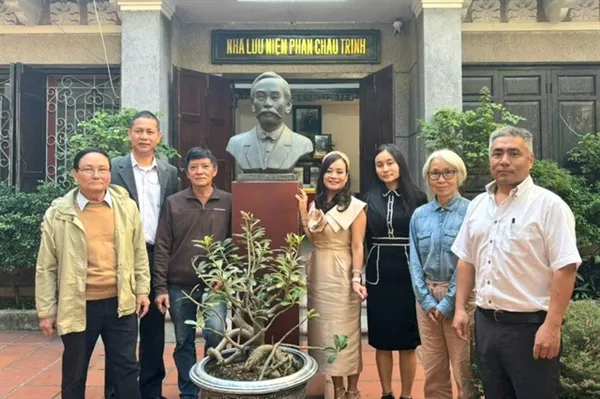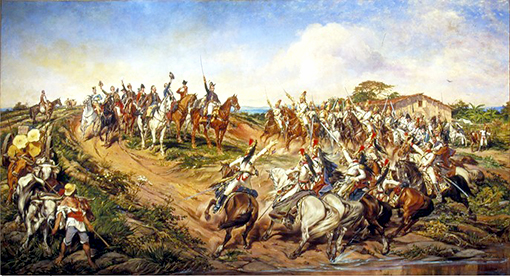 Expat Corner
Expat Corner

On the ocassion of Brazil’s Independence day on September 7, Brazilian Ambassador Fernando Apparicio da Silva writes for Việt Nam News
On the occasion of Brazil’s Independence day on September 7, Brazilian Ambassador Fernando Apparicio da Silva writes for Việt Nam News:
On Tuesday, September 7, Brazilians celebrated the Independence of Brazil, the 199th anniversary of that September morning of 1822 when, mounted on his horse, Prince Regent Pedro raised his sword and shouted his famous “Independence or Death” call.
With this gesture, the independence of Brazil - which had been a Portuguese colony for three centuries – was proclaimed. The scene was on the banks of a small river called Ipiranga, which crossed the city of São Paulo. The river does not exist anymore, or either it does, but simply as a stream of water running beneath the metropolis’ skyscrapers.
In the beginning of the 19th century, winds of change in the world brought about the independence of Brazil. History’s tectonic plates were to dislocate again in the beginning of the 20th century, when events following World War I had effects that echoed throughout the rest of the century. The same is happening in the amazing first decades of our 21st century. Accelerated geopolitics, in the context of a worldwide pandemic, incite us to think on how the world will be in one generation from now. At this moment, we are in the realm of the imponderable.

|
| Independence or death by Pedro Américo, 1886, Itamaraty Collection |
From the middle of the 19th century, Brazil was the destination of several immigration currents, coming from different horizons. Before that, hundreds of thousands of Africans had arrived in Brazil, against their will in a process associated with a sad history of violence. The Brazilian people are the result of the amalgam of indigenous peoples, African, European, Middle-Eastern and Asians, whose encounter produced a cultural syncretism that is an essential feature of the Brazilian soul.
Brazilians see the world through mixed perspectives. At the same time, Brazil is huge in territory, population and economy and, in their own soil, Brazilians have the experience of contrasts, inequalities and dichotomies pervading the world as a whole. Brazil is not a simple country. In the words of Brazilian Bossa composer Tom Jobim, “Brazil is not for beginners”.
A total of 17,000 kilometers separate Brazil from Việt Nam. Brazilians and Vietnamese, though, are close in their hearts and souls. The Vietnamese hold Brazil in high esteem and Brazilians are aware that the Vietnamese, in their fight for national sovereignty, wrote one the most heroic pages of 20th century’s history. As said by Việt Nam’s great leader Hồ Chí Minh, "nothing is more precious than independence and freedom".
Relations between Brazil and Việt Nam have developed rapidly in a short period of time. Trade has increased significantly. An eventual trade agreement between Việt Nam and MERCOSUR will give momentum to this trend. Diplomacy is much more than trade, there are other frontiers in the frontiers in the bilateral relations to explore, but it is interesting to note that Brazil’s foreign trade is expected to reach a record figure in 2021, an achievement due in great part to the increase in trade with Asian countries. Asia enjoys a key position in the world economy, in world diplomacy, in world science and technology, and Southeast Asia and Việt Nam are strategic in Asia and in the world. Việt Nam is a member of ASEAN, an association with which Brazil wishes to enhance relations.
Promoting the Portuguese language, in its Brazilian variant, is an objective of Brazil’s foreign policy. Portuguese is the language of 210 million Brazilians and Brazilian culture expresses itself essentially in Portuguese. Brazilian artists, musicians, and film makers have shown the world the cultural effervescence of Brazil. In this regard, I commend the work of Hà Nội University’s Department of Portuguese. The arrival in Hà Nội of a new Brazilian lecturer in 2022 is a good omen in that sense.
National independence, as stated in the Brazilian Constitution, is one of the principles that must govern Brazil’s external relations, together with nine others, such as self-determination, non-intervention, equality among States, peaceful settlement of conflicts, defense of peace and cooperation for the progress of all mankind. These are all enshrined principles of International Law. On their basis, there are challenges. As was stated by Brazil’s FM Carlos França when he took office last April, there are urgencies in the fields of health, economy and sustainable development

|
| The Independence Monument, São Paulo, 1926, built at the place where independence was proclaimed in 1822. Courtesy Photos of the embassy |
Before concluding, I wish to refer to a curious fact, which I dare picture as premonitory of the encounter between Brazil and Việt Nam centuries later.
In 1530, the Portuguese navigator Duarte Coelho was allotted by the king of Portugal with the governorship of Pernambuco in the Northeast of Brazil. There he founded the city of Olinda, the site of one of the most cheerful street carnivals in Brazil today. Some years before in Malaca, Duarte Coelho was assigned with an important mission: to reach Việt Nam and establish a trade post there. The mission failed, but this was not a reason for him not to be considered one the greatest navigators of his time.
I can imagine his eyes shining at the sight of the gorgeous beaches he came across in Pernambuco when he arrived. At that moment, he might have remembered the shores that he had spotted in Việt Nam. Duarte Coelho, the first governor of Pernambuco, was thus the first person who had ever known the lands that would become the Federative Republic of Brazil and the Socialist Republic of Việt Nam.
Independence or Death: three words that children learn in their first history lessons at school in Brazil. Words to retain and inspire. Colonialism can endure in minds. It leaves stains that only the strength of a people can erase.
“The placid banks of the Ipiranga heard the resounding shout of a heroic people, and at that very moment in shining beams the sun of liberty shone in our homeland’s skies.” So starts the Brazilian national anthem, which, at its very beginning, reserved to the small Ipiranga, as one can see, a privileged, honored place. VNS




